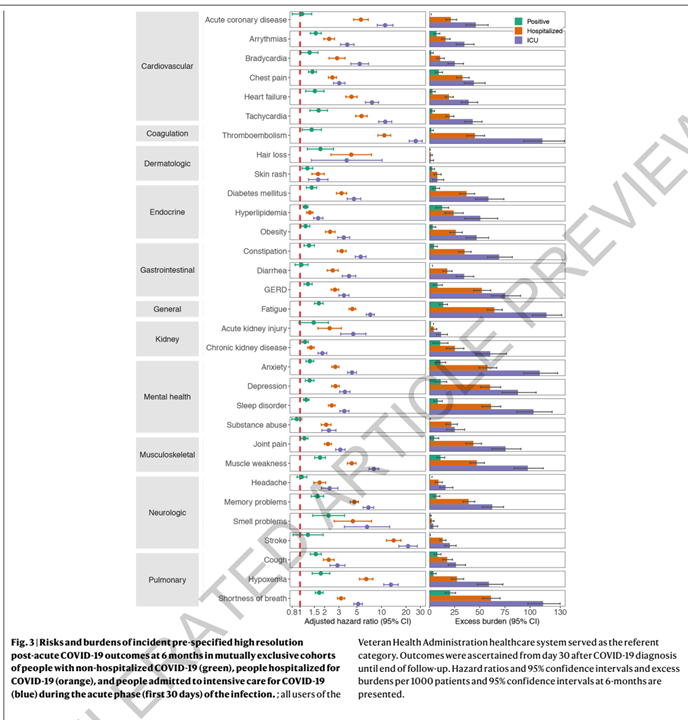There is ample evidence that the body does not come back to pre-Covid equilibrium for some people, partly due to permanent damage to cells in different organs (as varied as pancreas, brain, lungs) for some and/or heightened inflammatory state in the body.
2/n
In light of this, it is important to recognize that there is need for caution even later. The impact of some of these long-covid conditions can be non-fatal but chronic. More worrying is the potential risk of death even months later.
3/n
I had heard of anecdotes first-hand from multiple friends of people passing away due to heart attacks, strokes, and pulmonary embolism. My interest in researching this in more detail was because it is affecting so many of us in India at the moment.
4/n
After a lot of perusing through medical papers through databases, I came across this study published in Nature.
High-dimensional characterization of post-acute sequalae of COVID-19
https://t.co/9C1EjHBUID PDF can be downloaded here
5/n
First, what is a sequela?
A typical sequela is a chronic complication of an acute condition - in other words, a long-term effect of a temporary disease or injury - which follow immediately from the condition.
6/n
Unlike other studies which had much lower number of patients (observations) this was the largest that I have seen to date - around 73,000 patients in the US Veterans database who got Covid.
7/n
A few parameters at the outset was a mean age of ~61, 88% males. They were tracked over a 6 month period and they checked on whether they developed any post-covid conditions, what drugs they needed to take, and what their pathology lab test results came like for key tests.
8/n
Do pre-existing health conditions affect severity seen in acute Covid? We anecdotally know that to be true and there is research on this too, that suggests so.
9/n
See the red box in the second-last tweet. The patients who had severe Covid (with ICU and without it) already had higher interaction with the Veteran healthcare system in the preceding year - being in long-term care already or more visits as outpatients.
10/n
This study is about post-Covid issues. Hence, the results should be seen in this light that if you already have a health issue you will most probably have more severe Covid and in turn, those with more severe Covid have higher risk of complications later on post-covid
11/n
There will still be cases of people who were relatively healthy to begin with but got Covid / had to go to hospital / ICU. I could not see separate data in this paper for this.
12/n
A fair question would be whether they have different risk as compared to already unhealthy people. Although, it is probably better to take greater care in any case because some of the outcomes as listed out are possibly fatal even.
13/n
Going on to the main study results.
Hazard ratio definition from wiki -> For example, in a drug study, the treated population may die at twice the rate per unit time of the control population. The hazard ratio would be 2, indicating higher hazard of death from the treatment.
14/n
In the figure below you will see hazard ratio comparison of covid +ve cases, hospital without ICU, and ICU cases.
15/n
Please see thromboembolism (blood clots leading to blockage as an example). Someone who went to hospital due to Covid (in that cohort with mean age 60 years) had a 10x risk compared to the general population. Someone who had an ICU stay had a 30x chance of an event.
16/n
Or see heart failure. Someone who went to hospital due to Covid (in that cohort with mean age 60 years) had a ~4x risk compared to the general population. Someone who had an ICU stay had a ~7x chance of a heart failure event.
17/n
There was additional data on excess burden. Basically, for every 1k people who got Covid, as compared to the general population, how many more people satisfied a condition as given in the tables (got a medical condition, had to take a medicine, had test levels as mentioned)
18/n
Key takeaway - There are continuing risks for aggravations / chronic conditions in anybody who has had Covid and even more so for anyone who has been to a hospital without ICU and high risks for those who went to an ICU, in older age groups.
19/n
Key takeaway - Data for younger people is not there in this study. Risks will be lesser for younger people in a non-linear way per my reading but some risks surely will be there nevertheless.
20/n
My purpose for sharing this data, like an earlier thread I shared was that doctors that you go to may or may not have read this. Covid is new for the world as much as the medical community.
21/n
It is in YOUR interest to share data like this with your doctor and ask for the best advice based for yourself or people you know to prevent whatever can be prevented.
22/n
For example, per this earlier thread I shared that a good question to ask your doc would be whether it is useful to do a D-dimer test after a month or even 2 months and what does the doc have to say about thinners if the level is high?
https://t.co/puY0RaUDi5 23/n
If you find this useful, do a good deed and share it with others. I have heard of enough preventable cases related to blood clotting for example.
Watch out for yourself and take care. Prevention is better than cure was never so apt.
24/n































